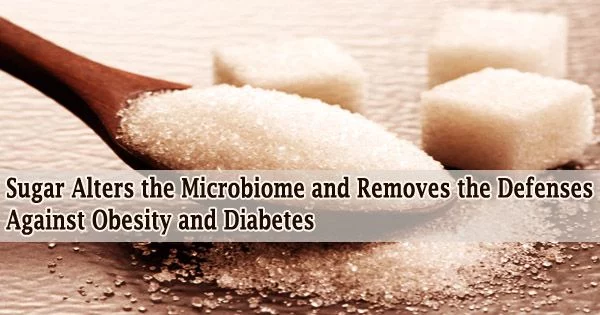Dietary sugar affects the gut flora, triggering a series of events that result in metabolic illness, pre-diabetes, and weight gain, according to a mouse study.
The results, which were published today in Cell, indicate that while nutrition is vital for the prevention of metabolic syndrome, diabetes, and obesity, a healthy microbiota is as crucial.
Diet alters microbiome
Obesity, metabolic syndrome, and diabetes can be brought on by a Western-style high-fat, high-sugar diet, although it is unclear how this happens.
Ivalyo Ivanov, PhD, associate professor of microbiology & immunology at Columbia University Vagelos College of Physicians and Surgeons, and his colleagues looked into the early effects of the Western-style diet on the microbiome of mice because the gut microbiome is essential for an animal’s nutrition.
The mice had signs of metabolic syndrome after four weeks on the diet, including weight increase, insulin resistance, and glucose intolerance. Additionally, their microbiomes have undergone significant changes, with other bacteria becoming more prevalent and the proportion of segmented filamentous bacteria, which are typically seen in the gut microbiota of rodents, fish, and poultry, rapidly declining.
Our study emphasizes that a complex interaction between diet, microbiota, and the immune system plays a key role in the development of obesity, metabolic syndrome, type 2 diabetes, and other conditions. It suggests that for optimal health it is important not only to modify your diet but also improve your microbiome or intestinal immune system, for example, by increasing Th17 cell-inducing bacteria.
Ivalyo Ivanov
Microbiome changes alter Th17 cells
The researchers discovered that the decrease in filamentous bacteria was essential for the wellbeing of the animals due to its impact on Th17 immune cells. Further research found that the Th17 cells are essential for preventing metabolic illness, diabetes, and weight gain. The decrease in filamentous bacteria decreased the amount of Th17 cells in the stomach.
“These immune cells produce molecules that slow down the absorption of ‘bad’ lipids from the intestines and they decrease intestinal inflammation,” Ivanov says. “In other words, they keep the gut healthy and protect the body from absorbing pathogenic lipids.”
Sugar vs. fat
What component of the high-fat, high-sugar diet led to these changes? Ivanov’s team found that sugar was to blame.
“Sugar eliminates the filamentous bacteria, and the protective Th17 cells disappear as a consequence,” says Ivanov. “When we fed mice a sugar-free, high-fat diet, they retain the intestinal Th17 cells and were completely protected from developing obesity and pre-diabetes, even though they ate the same number of calories.”
But not all mice benefited from the sugar ban. Elimination of sugar had no positive effects on individuals without filamentous germs to begin with; instead, the animals gained weight and acquired diabetes.
“This suggests that some popular dietary interventions, such as minimizing sugars, may only work in people who have certain bacterial populations within their microbiota,” Ivanov says.
Certain probiotics might be beneficial in those circumstances. Despite the mice’s ingestion of a high-fat diet, filamentous bacteria supplements resulted in the recovery of Th17 cells and protection against metabolic syndrome in Ivanov’s lab.
Ivanov believes that different bacteria in people may have the same protective benefits as mice, despite the fact that people do not have the same filamentous bacteria as mice. Giving mice Th17 cells also offered protection and may have therapeutic benefits for humans.
“Microbiota are important, but the real protection comes from the Th17 cells induced by the bacteria,” Ivanov says.
“Our study emphasizes that a complex interaction between diet, microbiota, and the immune system plays a key role in the development of obesity, metabolic syndrome, type 2 diabetes, and other conditions,” Ivanov says.
“It suggests that for optimal health it is important not only to modify your diet but also improve your microbiome or intestinal immune system, for example, by increasing Th17 cell-inducing bacteria.”





